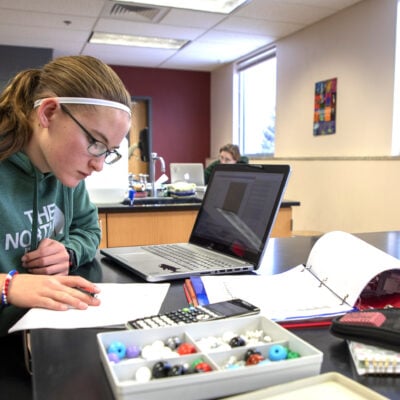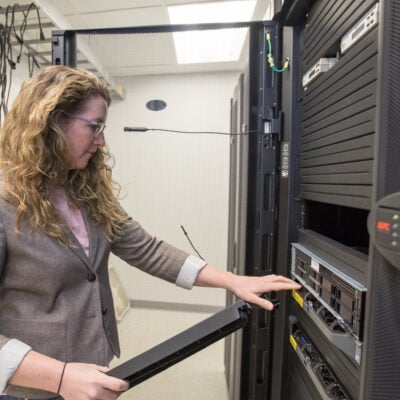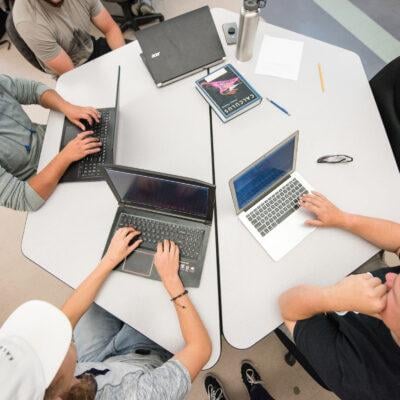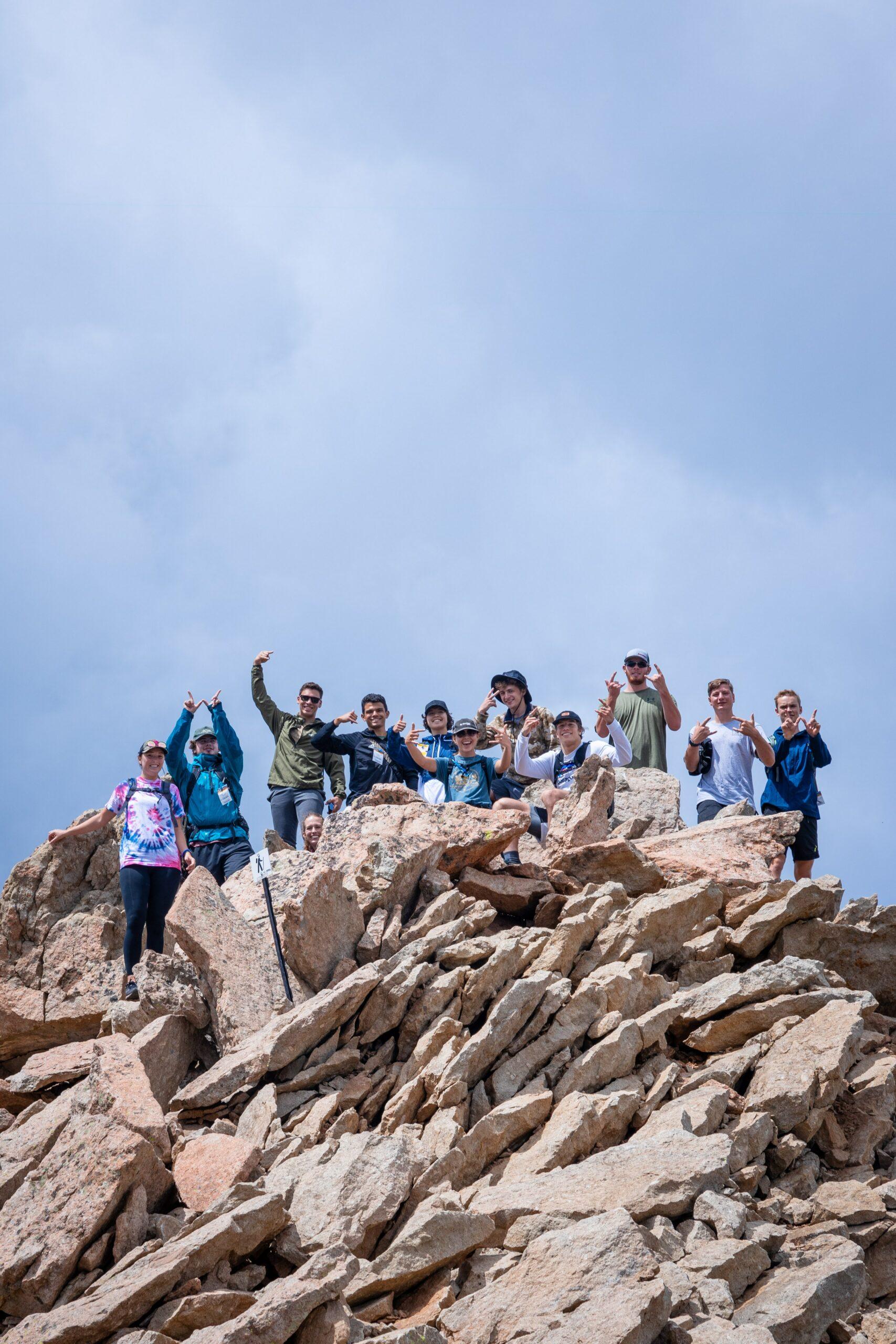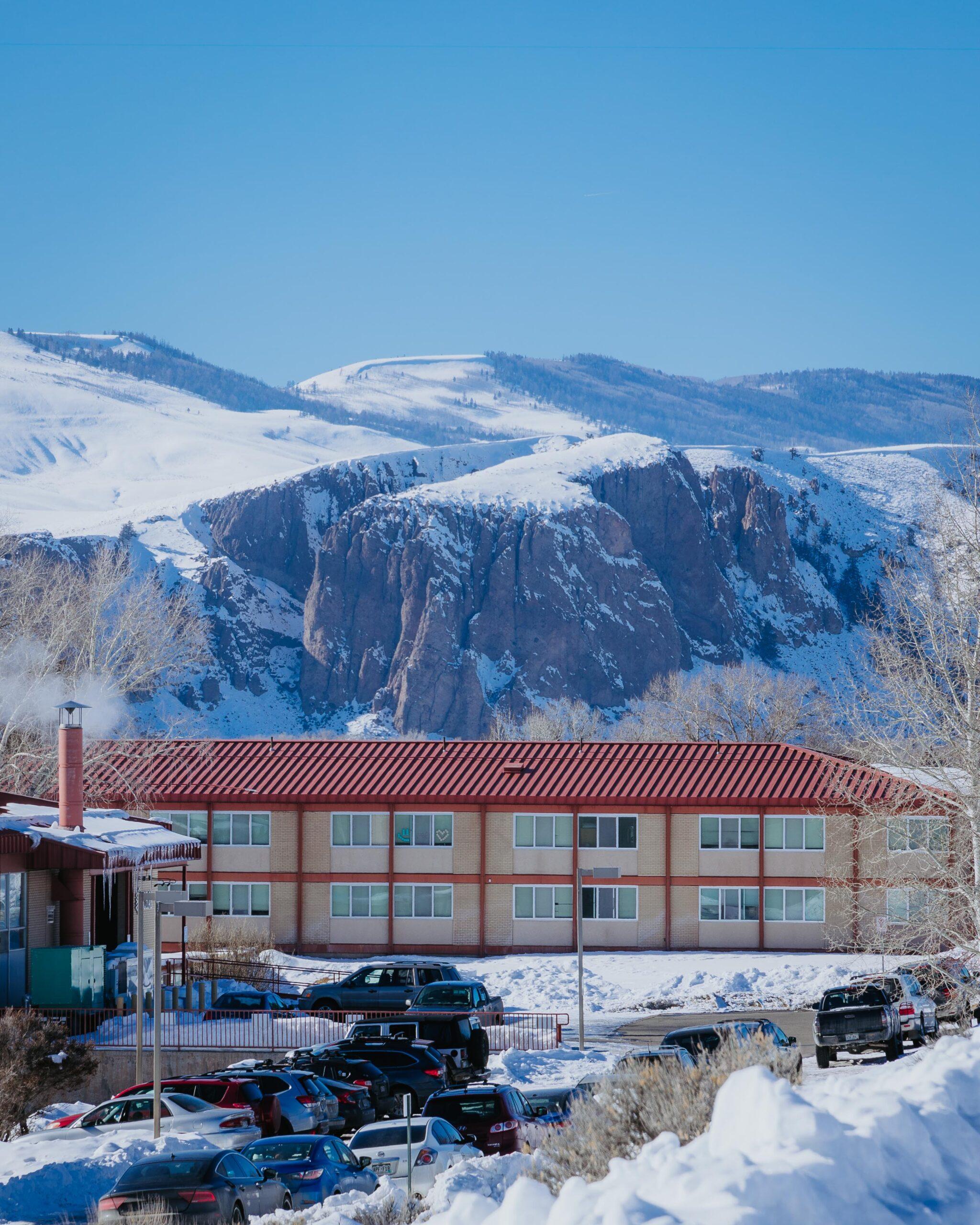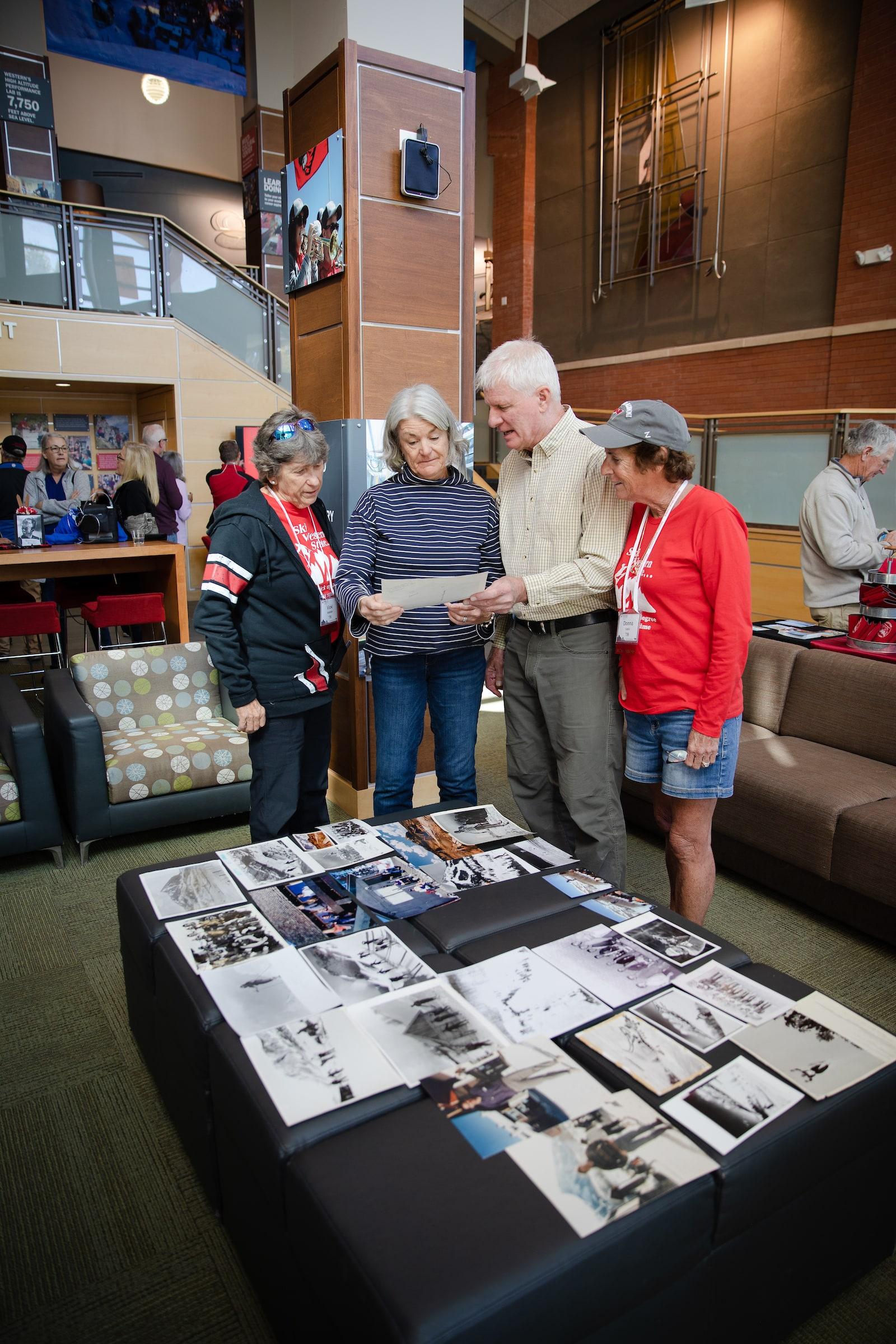In this new program, you’ll have the opportunity to earn your Bachelor of Science degree from the University of Colorado Boulder’s College of Engineering & Applied Science, the highest-ranked public school in Colorado and 16th among public engineering programs in the nation. You’ll be admitted as a Western student, and after your second year, you’ll transfer to University of Colorado Boulder to complete your degree—all while enjoying the personal attention, small class sizes, spectacular surroundings and adventurous community of Western Colorado University.
Program Overview

Earn an increasingly relevant and prestigious degree.
Computer science is concerned with how computers are constructed, how they store and process data, how they are used in problem-solving and how the quality of those solutions are assessed. It is about the science of creating software for a variety of users and understanding how that software interacts with the hardware on which it is run. Computer scientists work most often on the hardware and software aspects of system design. They develop new theories of computation and algorithms, design new hardware and sensors, develop large software systems, evaluate the utility and usability of software systems and study the impacts of computing technology on society. (Courtesy of University of Colorado Boulder)
In the program, you’ll have an unparalleled opportunity through Western’s unique partnership program. You’ll complete your initial two years as a Western student, then transfer to University of Colorado Boulder to finish the program—all while attending classes at Western’s campus in Gunnison. Through the program, you’ll benefit from the experience of renowned faculty with the latest knowledge in computing, while earning a prestigious degree from the University of Colorado Boulder. You’ll graduate with hot career prospects and be more than prepared to meet the demands of the field.
The Western-CU Partnership program in Computer Science will seek accreditation by the Accreditation Board for Engineering and Technology (ABET). To learn more about Western’s accreditation, visit this page.
State-of-the-art facilities
The partnership program is housed in the new, state-of-the-art Paul M. Rady School of Computer Science & Engineering at the heart of Western’s campus. The new school and partnership program were created with an astounding $80 million gift from an alumnus who as CEO of Antero Resources in Denver has recognized an ever-growing demand for seriously trained, well-rounded computer science and engineering professionals.
Program Requirements
At Western, course rotations are crafted to encompass a variety of subject fields for a comprehensive education and versatile degree. For required courses and degree plans, visit the official University Catalog. Below is a general overview of courses at Western Colorado University related to this area of study.
The Bachelor of Science Degree in Computer Science obtained through the Computer Science & Engineering Partnership Program is conferred by the University of Colorado Boulder. Lower-division coursework is completed through Western Colorado University before applying for admission to the University of Colorado Boulder. The entire program is completed on the campus of Western Colorado University.
The Bachelor of Science Degree in Computer Science requires:
- Transfer to the University of Colorado Boulder of all coursework listed on the plan of study: https://www.colorado.edu/engineering-advising/get-your-degree/transfer-students/transfer-credit-policy
- At least 45 credits earned from the University of Colorado Boulder (residency requirement): https://www.colorado.edu/engineering-advising/get-your-degree/academic-expectations-policies
- A minimum of 128 credits earned to degree program
- Student knowledge and adherence to course prerequisites as listed in the course catalog
- A cumulative and major GPA of at least 2.00 (from entirely CU Boulder coursework as a student’s Western GPA will not continue in the CU portion of the program): https://www.colorado.edu/engineering-advising/get-your-degree/academic-expectations-policies
- Satisfactory completion of all HEAR requirement deficiencies
Students can learn more about the Western-CU Partnership Honors Program Certificate HERE.
Program Goals
- Analyze a complex computing problem and to apply principles of computing and other relevant disciplines to identify solutions.
- Design, implement, and evaluate a computing-based solution to meet a given set of computing requirements in the context of the program’s discipline.
- Communicate effectively in a variety of professional contexts.
- Recognize professional responsibilities and make informed judgments in computing practice based on legal and ethical principles.
- Function effectively as a member or leader of a team engaged in activities appropriate to the program’s discipline.
- Apply computer science theory and software development fundamentals to produce computing-based solutions.
Program Requirements
The Computer Science program requires 128 cumulative credits applied to the degree, which includes courses from Western Colorado University (Western) and the University of Colorado (CU) Boulder.
This program provides a seamless transfer of coursework from the Gunnison residential campus for a Bachelor of Science Degree in Computer Science awarded by CU Boulder. A student must meet the admission requirements for the CU Boulder College of Engineering & Applied Science (CEAS) and may apply for admission when they have established a successful collegiate record as a Western student. This is demonstrated through academic requirements outlined at https://western.edu/program/computer-science-university-colorado-partnership/transition-to-cu-boulder/
Students are expected to follow the Academic Policies of the respective University/Universities in at which they are registered.
- Western: https://catalog.western.edu/undergraduate/policies/
- CU Boulder College of Engineering & Applied Science: https://www.colorado.edu/engineering-advising/get-your-degree/academic-expectations-policies
Planned Western coursework is outlined below in red font and course numbers are all three digits, while CU Boulder coursework is outlined below in black font and course numbers are all four digits. Students must complete 45 credits of CU Boulder coursework.
Degree Requirements - Courses
| Code | Title | Credits |
|---|---|---|
| College Writing Requirement (total of 3 credit hours) | ||
| ENG 302 | Technical Writing | 3 |
| Mathematics (total of 17 credits) | ||
| MATH 151 | Calculus I (GT-MA1) | 4 |
| MATH 200 | Discrete Mathematics | 3 |
| MATH 251 | Calculus II | 4 |
| MATH 314 | Applied Probability | 3 |
| CSCI 2820: Linear Algebra with CS Applications | 3 | |
| Computer Science (minimum 58 credit hours) | ||
Computer Science Foundation | ||
| HWTR 100 | First Year Seminar (complete 1 approved section) | 1 |
| CS 191 | Computer Science II | 3 |
| CS 280 | Data Structures | 3 |
| CS 330 | Operating Systems and Architecture | 3 |
| CS 370 | Systems Programming in C | 3 |
| CS 412 | Software Engineering | 3 |
| CSCI 3155: Principles of Programming Languages | 4 | |
| CSCI 3104: Algorithms | 4 | |
Computer Science Core | ||
Select five CU Boulder classes from approved list | ||
Computer Science Electives | ||
Additional upper-division CSCI courses to bring total computer science hours to 58 or higher. | ||
Senior Capstone | ||
CSCI 4308: Software Engineering Project I | ||
CSCI 4318: Software Engineering Project II | ||
A two-semester Senior Capstone (beginning fall, ending spring) is required for 8 credit hours. This sequence must be taken contiguously and may not be taken before the senior year. Prerequisites for a senior capstone include the successful completion of the college writing requirement, as well as the Computer Science Foundation (24 credit hours) plus Computer Science Core and Elective courses to reach a minimum of 36 Computer Science credit hours. | ||
| Natural Science (total of 17 credit hours) | ||
| PHYS 190 & PHYS 185 | General Physics I (GT-SC2) and Laboratory Physics I (GT-SC1) | 4 |
One additional Natural Science sequence from the following: | ||
| PHYS 191 & PHYS 186 | General Physics II (GT-SC2) and Laboratory Physics II (GT-SC1) | 4 |
| BIOL 150 | Biological Principles (with laboratory) (GT-SC1) | 4 |
| CHEM 111 & CHEM 112 | General Chemistry I (GT-SC2) and General Chemistry Laboratory I (GT-SC1) | 4 |
| CHEM 121 | General Chemistry for Engineers | 3 |
Additional Natural Science hours to reach 17 total credit hours: | ||
| ANTH 218 | Biological Anthropology (with laboratory) | 4 |
| BIOL 130 | Environmental Biology (GT-SC2) | 3 |
| BIOL 135 | Environmental Biology Laboratory (GT-SC1) | 1 |
| BIOL 150 | Biological Principles (with laboratory) (GT-SC1) | 4 |
| CHEM 111 & CHEM 112 | General Chemistry I (GT-SC2) and General Chemistry Laboratory I (GT-SC1) | 4 |
| CHEM 113 & CHEM 114 | General Chemistry II and General Chemistry Laboratory II | 4 |
| CHEM 121 | General Chemistry for Engineers | 3 |
| ENGR 224 | Materials Science | 3 |
| ENGR 363 | Mechanics of Solids | 3 |
| GEOL 101 | Physical Geology (GT-SC2) | 3 |
| GEOL 105 | Physical Geology Laboratory (GT-SC1) | 1 |
| GEOL 201 | Historical Geology (with laboratory) | 4 |
| MCEN 3012 | Thermodynamics | 3 |
| PHYS 110 | Introductory Astronomy (GT-SC2) | 3 |
| PHYS 191 & PHYS 186 | General Physics II (GT-SC2) and Laboratory Physics II (GT-SC1) | 4 |
| PHYS 250 | Statics | 3 |
| PHYS/ENGR 251 | Dynamics | 3 |
| PHYS 320 | Modern Physics | 3 |
| Numerous other courses available through CU Boulder | ||
| Logic and Ethics (total of 6 credit hours) | ||
| PHIL 135 | Introduction to Ethics | 3 |
| PHIL 100 | Critical Thinking | 3 |
| or PHIL 200 | Symbolic Logic | |
| Humanities & Social Sciences | ||
| Complete 15 credits of approved humanities and social science coursework, 6 credits of which must be upper-division. | ||
| Free Electives | ||
| Complete enough electives to bring the total credit hours toward the degree to 128. Normally this is 12 credit hours but could vary (for example due to transfer credits). Please consult with your academic advisor or Partnership Program Director with questions. | ||
The following plan lists all the specific course requirements for the Bachelor of Science Degree in Computer Science from the University of Colorado Boulder in partnership with Western Colorado University. The order in which these courses are taken may vary with course availability. Students are responsible for completing all course prerequisites. Please note that this is a suggested degree program; your program may vary.
Planned Western coursework is outlined below in red font and course numbers are all three digits, while CU Boulder coursework is outlined below in black font and course numbers are all four digits. Students must complete 45 credits at CU Boulder.
| Year One | ||
|---|---|---|
| Fall | Credits | |
| CS 190 | Computer Science I | 3 |
| ENG 102 | Writing and Rhetoric I (GT-CO1) | 3 |
| H&SS lower-division | 3 | |
| HWTR 100 | First Year Seminar | 1 |
| MATH 151 | Calculus I (GT-MA1) | 4 |
| PHYS 190 & PHYS 185 |
General Physics I (GT-SC2) and Laboratory Physics I (GT-SC1) |
4 |
| Credits | 18 | |
| Spring | ||
| CS 191 | Computer Science II | 3 |
| MATH 251 | Calculus II | 4 |
| Natural Science Sequence (PHYS 191 & 186 preferred) | 4 | |
| PHIL 100 or PHIL 200 |
Critical Thinking or Symbolic Logic |
3 |
| H&SS lower-division | 3 | |
| Credits | 17 | |
| Year Two | ||
| Fall | ||
| CS 280 | Data Structures | 3 |
| CS 330 | Operating Systems and Architecture | 3 |
| MATH 314 | Applied Probability | 3 |
| Natural Science | 3 | |
| H&SS lower-division | 3 | |
| Credits | 15 | |
| Spring | ||
| CS 370 | Systems Programming in C | 3 |
| CS 412 | Software Engineering | 3 |
| MATH 200 | Discrete Mathematics | 3 |
| PHIL 135 | Introduction to Ethics | 3 |
| Free Elective | 3 | |
| Credits | 15 | |
| Year Three | ||
| Fall | ||
| CSCI 3104 Algorithms | 4 | |
| CSCI 2820 Linear Algebra with CS Applications | 3 | |
| CSCI Core/Elective | 3 | |
| CSCI Core/Elective | 3 | |
| Natural Science | 3 | |
| Credits | 16 | |
| Spring | ||
| CSCI Core/Elective | 4 | |
| CSCI 3155 Principles of Programming Languages | 4 | |
| CSCI Core/Elective | 3 | |
| ENG 302 | Technical Writing | 3 |
| Credits | 14 | |
| Year Four | ||
| Fall | ||
| CSCI 4308 | Software Engineering Project I | 4 |
| CSCI Core/Elective | 4 | |
| CSCI Core/Elective | 3 | |
| Natural Science | 3 | |
| H&SS upper-division | 3 | |
| Credits | 17 | |
| Spring | ||
| CSCI Core/Elective | 3 | |
| CSCI 4318 | Software Engineering Project II | 4 |
| CSCI Core/Elective | 3 | |
| H&SS upper-division | 3 | |
| Free Elective | 3 | |
| Credits | 16 | |
| Total Credits | 128 | |
Careers
Take the first steps toward your dream career.
Career preparation is the primary focus of every academic program at Western. Our professors and Office of Career Services will help you identify your strengths, hone your skills, define your goals, and prepare for a fulfilling role in hundreds of professional fields after graduation.
The data is automatically collected by Lightcast, a firm that sources job market data. The statistics illustrate general trends in U.S. careers, but do not precisely represent every job and salary.
Scholarships
Western’s Scholarship Application portal allows you to search for, apply to and manage your scholarship opportunities. This platform houses over 300+ departmental and privately funded scholarship opportunities available to both new and returning students. Through the scholarship portal, students may identify scholarship opportunities based on academic program, campus involvement, academic standing, specific keywords and more. Students may click below to begin learning about what scholarship opportunities are available to them.
Please check individual scholarship opportunity start dates and deadlines as there are exceptions.
Find your scholarships!Eligibility
- Accepted to Western by April 15
- Declared major in the Computer Science or Mechanical Engineering partnership programs by April 15
Award Amount Tiers based on High School GPA
- 3.50-3.749
- $3,500 In-State
- $9,000 Out-of-State
- 3.75-3.999
- $5,000 In State
- $10,500 Out-of-State
- 4.0
- $6,500 In-State
- $12,000 Out-of-State
Renewal Criteria
- Remain in the partnership program
- Maintain a cumulative GPA of 3.0 or better
- Complete MATH 151 Calculus 1 with grade of C or better prior to the start of second fall semester (to be evaluated at the end of first spring semester).
Description
The Rady Merit Scholarship is awarded for 4 semesters (maximum of 6 semesters upon successful appeal), while the student is considered a full-time Western student (enrolled in 12 credits or more) and Western is processing the student’s financial aid. The number of scholarships awarded is based on fund availability.
Western’s Scholarship Application portal allows you to search for, apply to and manage your scholarship opportunities. This platform houses over 300+ departmental and privately funded scholarship opportunities available to both new and returning students. Through the scholarship portal, students may identify scholarship opportunities based on academic program, campus involvement, academic standing, specific keywords and more. Students may click below to begin learning about what scholarship opportunities are available to them.
Please check individual scholarship opportunity start dates and deadlines as there are exceptions.
Find your scholarships!Alumni Association Future Alumni Scholarship
The Alumni Association Scholarship is a one-time scholarship of $1,000 and is applicable for the student’s junior or senior year at Western.
Any child or grandchild of an alumni is eligible to receive the Future Alumni Scholarship.
- This is a one-time non-renewable scholarship of $1,000.
- Only one Future Alumni Scholarship will be awarded per academic year.
- GPA must be 3.2 or above (college).
Due date has been extended to April 30 for 2024. An Alumni selection committee, appointed by the Alumni Advisory Council, will review applicants and select awardee by June 1.
Alumni Legacy Scholarship
The Alumni Legacy Scholarship is a one-time non-renewable scholarship and is only applicable for the student’s first year at Western (incoming freshman or new transfer students are eligible).
Do you have a son or daughter looking at college? Have they considered attending Western? As an alumni, your son, daughter and/or grandchildren are eligible for certain benefits distributed through this scholarship, as follows:
- This is a one-time scholarship of $1,000.
- Nominee must be an incoming first-year student or new transfer.
- The cost of orientation is reduced by half (a $45 value).
- The admission application fee is waived (a $30 value).
- GPA must be 2.5 or above (high school or college of transfer).
The applicant must fill out the application form found below. Application forms are accepted year-round. If the applicant meets the GPA guidelines, the scholarship will be awarded.
Mountaineer Alumni Recommendation Scholarship
The Mountaineer Alumni Recommendation Scholarship is a one-time non-renewable scholarship and is only applicable for the student’s first year at Western. This scholarship is not available to midyear transfers or students beginning in the spring semester.
Are you an alumni or employee of Western and know a prospective (or incoming) student who would be a great fit at Western? A recommendation from alumni and employees can support any new student and provide them a $500 scholarship their first year. (Western employees may not recommend a spouse or dependent receiving tuition benefits).
- Any Western alumni/employee may nominate only one student per academic year to receive the $500 scholarship (distributed $250 per semester).
- The scholarship is good for the first year only and is non-renewable.
- The recommended student must be a full-time undergraduate student, attending Western for the first time.
The applicant must fill out the application form found here. The nominating alumni/employee must fill out the application form and submit the required documents by June 1. The recommended student must meet university admissions acceptance standards and complete the Free Application for Federal Student Aid (FAFSA).
The Presidential Promise is guaranteed to students who have received a scholarship through the Denver Scholarship Foundation (DSF) and/or GearUp—and are eligible for a Pell Grant.
For students who meet these criteria, Western will cover the cost of tuition and fees through the combination of federal, state and institutional aid. For more information on the Presidential Promise, visit our scholarships page.
Western Undergraduate Exchange (WUE) or Central Plains (CP) tuition represents a substantial savings relative to normal, out-of-state tuition. Students eligible for the WUE or CP program will be charged 150% of Western’s total in-state tuition. For 2018-19, total in-state tuition was $8,934. WUE/CP tuition was $13,401. The WUE/CP discount is valued at $4,695.
For more information about the WUE and CP geography-based programs, visit Western’s Tuition Discount Programs Page.
Immediately upon acceptance at Western, every student is considered for a merit scholarship worth between $2,500-$4,500 per year for in-state students and $8,000-$10,000 for out-of-state students. The amount is based on the student’s GPA and ACT/SAT scores. Visit our Net Price Calculator at western.edu/cost to determine whether you qualify for a merit scholarship.
For more information about merit scholarships at Western, visit our scholarships page.
Get Involved

Where collaboration meets education.
A college education is so much more than just taking classes. Expand your community and network, while gaining hands-on experience in your field.
- Professional Societies and Student Clubs: Students are encouraged to participate in professional societies and student clubs related to engineering and computer science. Currently, Western offers the following opportunities for students to get involved: ASME, SWE, SAE, ACM, WACM, Engineers Without Borders, Maker’s Society, and Need for Speed Club.
- Seminar Series: Each semester, faculty at the Rady School invite industry leaders to discuss their experiences with students. Previous speakers include the Senior Project Manager of Blade Design at Siemens Gamesa Renewable Energy, designers of the largest wind turbine blades in the world; the owner and CEO of Red Canary, a cybersecurity company with multiple Fortune 500 clients; and the co-founder of PACT Outdoors, an outdoor industry manufacturer located in the Gunnison Valley.
- Lambda Learning Center (LLC): The LLC exists to provide academic support for math, computer science, and engineering, as well as to facilitate student learning beyond the classroom. Students, tutors, and professors get together and create a culture centered not only around understanding and mastering STEM-related coursework, but also exploring new ideas in STEM and building community.
- Residence Hall Community Building: Rady School students can elect to live in a Partnership Program Community during their first year at Western, allowing them to strengthen bonds with fellow students outside of class. The residence halls provide designated study spaces and a computer lab for students.
- Experiential Education Initiatives: The program curriculum is enhanced by numerous project-based, industry-focused experiential education initiatives that set it apart from other programs in the state. Students engage with the local community through project partnerships with the Adaptive Sports Center, and with the greater engineering community through the SAE Mini Baja competition.
- Social Media: Follow @RadySchoolatWestern on Instagram and TikTok to stay up-to-date with the engineering and computer science community at Western.
Career-ready
The need for Computer Scientists is staggering. Last year, there were 10 times more computing jobs than graduates in the field—some 540,000 open computing jobs.
Additional Resources
Department Information
Paul M. Rady School of Computer Science & Engineering
Program Director
Jenifer Blacklock, Ph.D.Director of the Western-CU Boulder Partnership Program
Assistant Director
Laurel FisherAssistant Director of the Western-CU Boulder Partnership Program
Rady Building Administrative Assistant
Kelley JonesAdministrative Assistant III
Campus Location
1 Western Way
Gunnison, CO 81231


